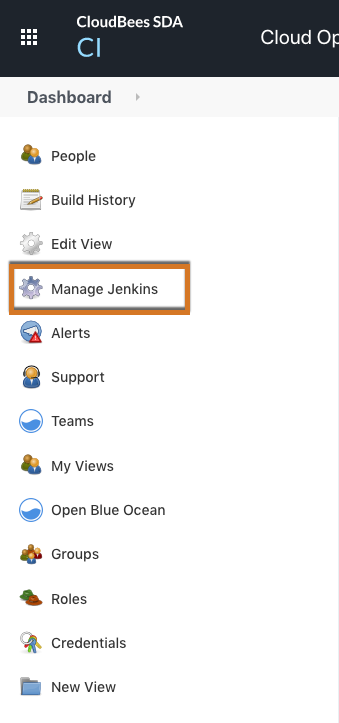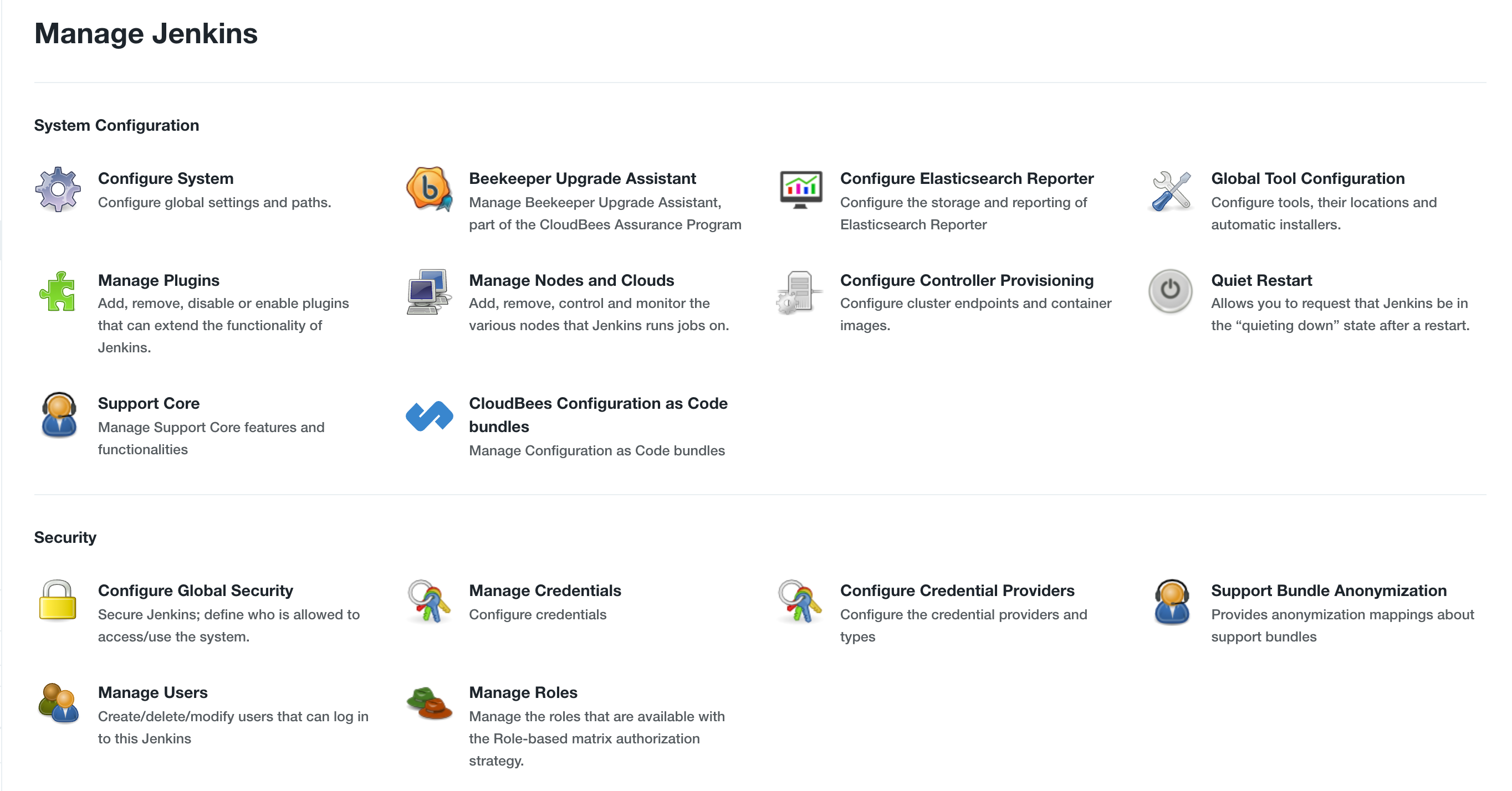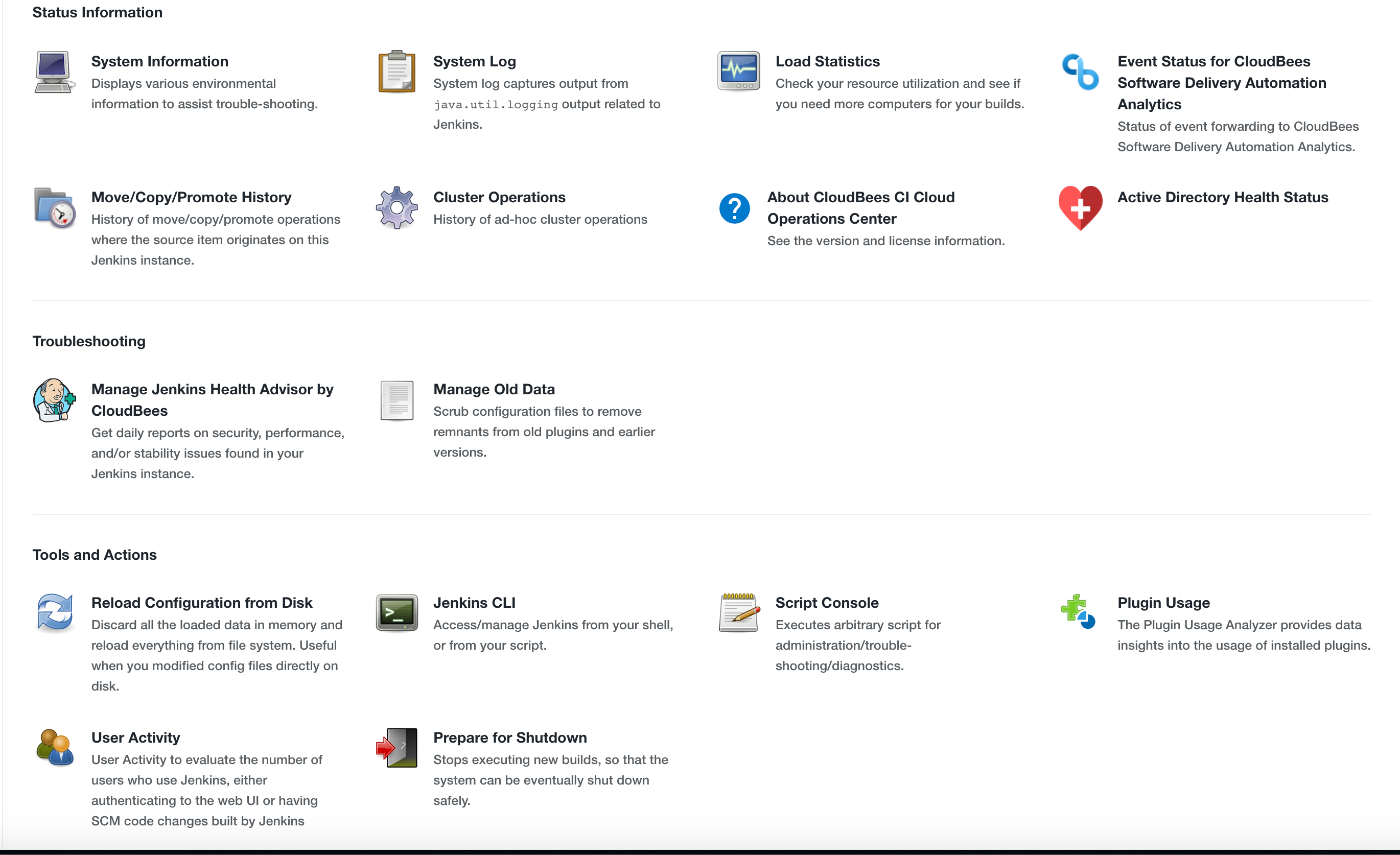The Manage Jenkins area of the operations center interface provides access to the core management features of your operations center instance.
To access Manage Jenkins:
-
Ensure you are signed in to the operations center as a user with the Administer permission.
-
From the operations center dashboard, in the left pane, select Manage Jenkins.

The Manage Jenkins page provides access to the following management features of your operations center instance.
| Some of the options below may not display depending on your configuration, plugins, and licensing. |


System Configuration
-
Configure System - Configures global settings and paths for the operations center.
-
Manage Plugins - Installs, updates, disables, enables, or removes plugins that can extend the functionality of the operations center.
-
Support Core - Configures settings for the CloudBees Support plugin. The CloudBees Support plugin is installed by default with CloudBees CI . It allows you to generate the diagnostic information that is used by CloudBees Support to resolve technical issues.
-
Beekeeper Upgrade Assistant - Manages the upgrade of the operations center and its plugins, including plugins that are part of the CloudBees Assurance Program. For more information, refer to Upgrading plugins with Beekeeper Upgrade Assistant.
-
Manage Nodes and Clouds - Adds, removes, controls, and monitors nodes, typically agents, that your operations center instance runs jobs/Pipeline projects on.
-
Configuration as Code Bundles - Manages bundles for Configuration as Code including the URLs and tokens for the bundles. For more information, refer to Configuration as Code for controllers.
-
Configure Elasticsearch Reporter - Configures settings for Elasticsearch Reporter. Elasticsearch Reporter is a set of Jenkins plugins that provides connectivity to remotely hosted Elasticsearch servers as well as insight into your Jenkins usage and the health of your Jenkins cluster. This option only displays if you have installed the Elasticsearch Reporter plugins.
-
Configure Controller Provisioning - Configures cluster endpoints and container images for controllers attached to the operations center instance.
-
Manage License - Manages your current operations center instance’s license.
-
Global Tool Configuration - Configures tools, their locations, and automatic installers for the operations center.
-
Quiet Restart - Lets you configure Jenkins to use a quiet start in which Jenkins starts, but it does not launch any projects. Quiet starts can be useful for scheduling upgrades and maintenance.
Security
-
Configure Global Security - Secures the operations center and defines who can access and use the system. It also provides access to the Role-based matrix authorization strategy. For more information, refer to Restricting access and delegating administration with Role-Based Access Control.
-
Manage Users - Creates, modifies or deletes users of your operations center instance.
-
Manage Credentials - Manages credentials.
-
Manage Roles (only visible if Role-based matrix authorization strategy is selected) - Allows the definition of roles, each of which can be assigned a subset of multiple permissions. Roles can then be applied to users through groups. For more information, refer to Restricting access and delegating administration with Role-Based Access Control.
-
Configure Credentials Providers - Configures credential providers and types.
-
Support Bundle anonymization - Provides anonymization bundles for support bundles.
Status Information
-
System Information - Lists your operations center instance’s system properties, environment variables, plugins, and thread dumps to assist with troubleshooting.
-
Move/Copy/Promote History - Provides a history of move/copy/promote operations, where the source item originates on your operations center instance.
-
System Log - Provides access to the output of
java.util.loggingassociated with your operations center instance and allows the managment of additional loggers. -
Cluster Operations - Provides access to a history of ad hoc operations on your operations center cluster, such as preparing the cluster for a shutdown, a safe restart, or a reindex of analytics.
-
Load Statistics - Checks your operations center instance’s resources usage.
-
About Jenkins - Lists your operations center instance’s version and license information, including its numerous third-party libraries.
-
Event Status for CloudBees Software Delivery Automation Analytics - Lets you configure the event status page, if you are a CloudBees Analytics user. The event status page helps you keep track of the CloudBees Unified Data Plugin’s status and ensure the connection is active. For more information, refer to Troubleshoot the data pipeline between CloudBees Analytics and CloudBees CI.
-
Active Directory Health Status - Lets you configure the Active Directory plugin, if you have it installed. The Active Directory plugin enables authentication through Active Directory.
Troubleshooting
-
Manage Jenkins Health Advisor by CloudBees - Lets you configure the Jenkins Health Advisor by CloudBees. The Jenkins Health Advisor by Cloudbees identifies issues like security vulnerabilities, performance problems, and plugin version conflicts and notifies you of them.
-
Manage Old Data - Saves old configuration files in an updated format that your operations center instance can use. This feature can also help remove configuration data remnants left behind from old plugins and earlier product versions.
Tools and Actions
-
Reload Configuration from Disk - Discards all loaded configuration-related data in memory and reloads it from the file system.
-
User Activity - Lets you configure the User Activity Monitoring Plugin. The CloudBees User Activity Monitoring plugin provides you with a dashboard summary of recent user activity to help you better understand licensing.
-
Jenkins CLI - Allows you to download and configure the Jenkins command line interface (CLI) tool. The Jenkins CLI provides tools to manage operations center jobs, projects, and agents and perform other administrative tasks.
-
Prepare for Shutdown - Prepares your operations center instance for shutdown.
-
Script Console - Allows the execution of arbitrary Apache Groovy scripts directly through the operations center interface, for administration, diagnostic, and troubleshooting purposes.
-
Plugin Usage - Lets you configure the CloudBees Plugin Usage Analyzer plugin to maintain and clean up your inventory of plugins. The CloudBees Plugin Usage Analyzer plugin automatically generates a weekly report that shows you where installed plugins are being used.